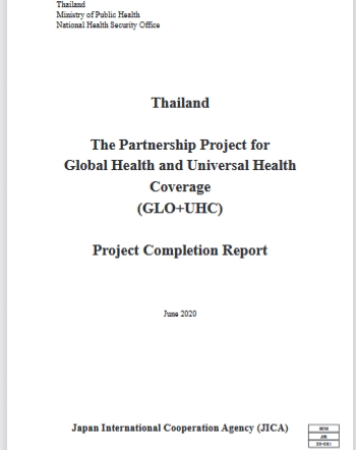The Partnership Project for Global Health and Universal Health Coverage (GLO+UHC) Project Completion Report
Background
In 2001, Thailand initially launched the Universal Coverage Scheme (UCS), targeting the population that had not been insured by the Civil Servant Medical Benefit Scheme (CSMBS) and the Social Security Scheme (SSS). This significant health reform enabled 99.5 percent of the population of Thailand to be covered by one of these three main public health schemes which made Thailand achieved Universal Health Coverage (UHC) since 2001.
Evidence demonstrates Thai UHC was pro-poor policy with significant performance of
increased access to health services and protecting households’ catastrophic and impoverishment from health expenditures.1 Although with significant achievement, many challenges still remains for better improvement such as
1) financial sustainability of Thai UHC in the context of increasing healthcare
costs,
2) different service coverages and purchasing mechanisms among the 3 main public health
schemes, and
3) the impact of the rapidly aging population on the health systems.
Under these circumstances, the Project was officially requested to the Government of Japan from the Government of Thailand whereby groups of Thai officials and personnel participated in trainings, organized by JICA, in Japan in 2013 and 2014. Japan’s experiences on how to manage social health insurance and health systems through the medical fee schedule and the roles of both central and local governments in the financial management of the health insurance were shared to Thai participants.
In addition, Japan and Thailand have worked extensively on global health issues, both at regional and international levels. Thailand has been known worldwide for achieving Universal Health Coverage (UHC) ahead of other low-middle income countries. Through its rich experiences, in recent years, Thailand has actively assisted other developing countries in working towards UHC. Thailand also played a key role as chairperson and secretariat for ASEAN Plus Three UHC network, which was established in 2014 to promote UHC in the region. With the good collaboration between Japan and Thailand in many other issues such as long term care and Prince Mahidol Award Conference (PMAC), Japan and Thailand agreed together to expand their collaboration to the field of UHC and Global Health. Thus, the Government of Japan and Thailand jointly agreed to work together on a technical cooperation project based on the concept of partnership

